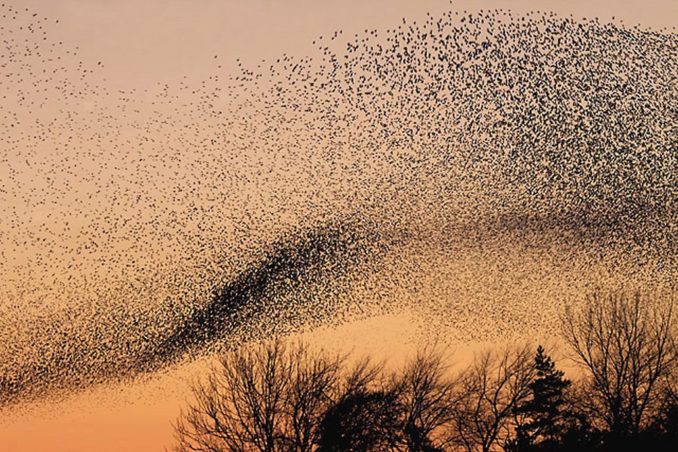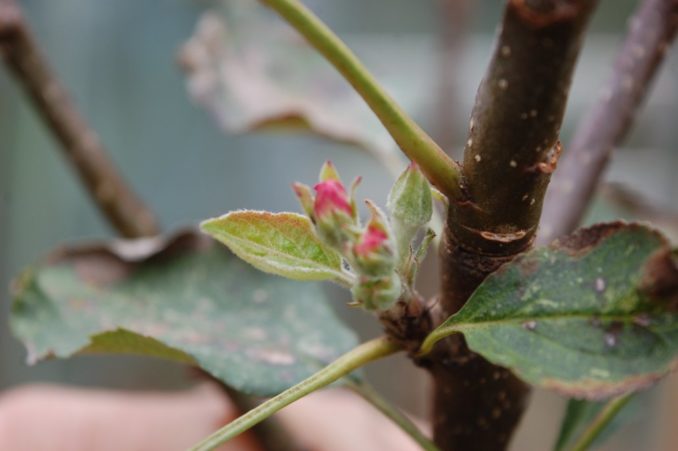
An old friend of mine, who would eyebrow me, till I’d assured her the dangerous word referred to the length of our acquaintance only, has been for some time working on translations of verses she’s discovered, that somehow escaped the unnecessary vigilance of ‘Bluff King Hal’s’ Commissioners. Whether these were at Glasney, Bodmin, Crantock, or somewhere else, she feels unable to assert. It took me much persuasion to convince her that these needed the light of day. Even then, it was only my assurance that ‘No-one reads the Comments’ (still less, the Articles) that allowed me her imprimatur.
Here’s one in vers libre, a form she personally does not like, given, as she says, that it encourages a low standard of craftsmanship:
A Murmuration
Cormorant-like, the Starling’s oily plumage
Glistens unwholesomely; Cormorant-like
The savage beak, ready to stab, slice, and shred
Serves well the Cormorant appetite.
In Winter’s months, no sooner have I cast
Crumbs, rinds, parings for my garden-birds, my
Timid Robin, agile Tit, and anxious Blackbird.
When, from nowhere, swooping down and scattering
All my favoured songsters, a dark and ominous
Rout of chattering Starlings – starvelings! – lights,
Waddling and striking, squabbling and fighting,
Locust-like devouring all: ugly, brutal.Yet sunset will transform these rabid brutes
As silently they wheel about the rosy sky,
Forming, and re-forming the ordered chaos
Of their cloud, ballooning, contracting, veering,
Soaring: by some avian mystery drawing
To themselves strays and stragglers in soundless
Harmony. Do they exult in this aerial Mastery?
Do they blindly do what their nature has decreed?
Lie they, perhaps, beneath some old Saint’s curse,
Having trampled and defiled his meagre mess,
So that in daylight they will look Satan’s crew,
Permitted at nightfall less than one hour to be
The Angelicals they might have been – then
To return to their dark and stinking roosts?
Here is another one in her disliked ‘free-verse’ – or is it blank verse? Readers might need to know that a ‘Maiden’ is an apple-tree of first-year growth, and that ‘Cornish Aromatic’ is a once highly-regarded cultivar. Perhaps the mildness of ‘Lyonesse’ encourages its far-too-early – or far-too-late? – blossoming.
Blossom-Emblem
My Birthday Month, my Apple-tree put forth
Sprigs of magenta buds which blossomed ‘til
Unfolding petals paled to pink then white;
Urgent uplifted anthers, primrose-tipped
Sought pollen which, duly exchanged for Nectar,
Bees brought, lured by the scent, deeply to probe
Sweet pools in each flower’s Nectaries.
Combing the golden gathered grains, dislodged
Others there to lie, impregnating the seed Below.And so, my Tree, my Maiden tree,
Bore fruit; my Cornish Aromatic’s stem
Weighed down, ungainly in its fructity,
Slenderly held her fruit to globe and ripen
In the mellowing sun, until they fell.
In late September, I gently removed the rest
Saving from slugs, birds, wasps.
As Autumn’s gales
Brought showering down, from other trees, last fruit,
My darling tree put forth another sprig –
A single sprig, four carmine buds, op’ning
In spite of westering winds; opening despite few Bees.Now, on St. Lucy’s Day, one month before
St. Agnes’, I have seen my Cornish maiden
Bearing the signs of her untimeliness.E’en so with me: I bore my fruit, as much
As ‘twas. And then long fallow years ensued,
But now, my heart puts forth untimely blossom
Which I know can not be fertilised, will
Bear no fruit.

© Jethro 2021
This picture, she says, was taken on a similar tree here in December [St. Lucy’s Day, used to be on Dec. 13th., St. Agnes’ Day on Jan. the 21st: you can see the slenderness of the stem with two of the ‘single sprig’ ‘carmine buds’ visible. A Squirrel, she considers, responsible for chewing away into the main stem, putting the young tree’s life in jeopardy and, perhaps, hence causing the tree to try desperately to produce seed. But I wonder whether there might be some deeper anguish behind those last lines. She is not to be drawn on this.
She will be very cross, I suspect, if she finds I’ve purloined the following, from a piece she’s still working on, so I rely on your discretion neither to read these lines, nor to mention them to anyone
Not seeking love, I found that Love found me:
Unlooked-for, unexpected, unprepared;
Unbidd’n, my long-dry heart leapt as of old.
Yet, wisdom whispered, ‘This can never be.
She is bright April to your cold December:
A chasm of years betwixt you lies. Let be!’Like the deaf Adder, Heart has stopped its ear:
“Faint heart ne’er won fair Lady!”: make her know
Though pure and delicate, this love is strong –
‘Strong as death’, unswerving, constant, never
To be dispelled, displaced, dismissed, out-grown.
This love is giving not demanding. [desunt caetera]
To my untutored eye, there could seem to be an underlying – theme is hardly the word – something (I disdain the word ‘commonality’), that made these verses particularly attractive to her, and so moved her to the arduous business of translating. They seem, prima facie, most unlikely to have been penned in a cell in an about-to-be-dissolved Monastery. Cast in an almost-Sonnet form… but, even if it were to close with a couplet, it would have a deficient rhyme-scheme to be ‘Shakespearean’. It seems so personal, yet she could hardly have herself penned lines to/about a ‘fair lady’, being a very proper person, with a refreshingly old-fashioned and straightforward way of seeing things. But, I know that she has made at least one sonnet-style attempt in her own verse: this one, for instance, she told me was ‘concocted’ at the end of a ‘creative writing course’, where they were given ten minutes to produce something on a single word – which turned out to be…
‘Tears’
It is long now, since tears and I have met:
My eyes are dry now, though they once were wet;
The founts are empty whence those tears once flowed
As dry and waste-strewn as a town’s bleak road.
What made those tears run I can not remember:
The fire has burned down to its last dull ember.
Among the ashes, some cold passion sleeps,
Yet Memory her lonely vigil keeps
This salty desert watered underneath.
I sigh, I mope, I groan, I grind my teeth;
I try to force a tear – a single one! –
As one may sneeze, who looks towards the Sun.
But eyes are dry. What is the use of weeping,
When all the passions and the sense lie sleeping.
There’s also one or two, she tells me (‘from my early days’) of a lighter tone and with, as she put it, ‘old-fashioned regularity’ – although one was written at the time of the Soviet invasion of Afghanistan…
© Jethro 2021
The Goodnight Vienna Audio file



